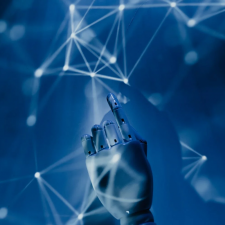Defining artificial intelligence is the first step to understanding it, but what exactly does the term encapsulate?
The term first originated in 1956 for the Dartmouth Summer Research Project on Artificial Intelligence, the very first iteration of the term being used to define language simulation, neuron nets, complexity theory and more in a summer workshop that founded the field of AI as we know it today. In other words, the first definition of AI was coined to define what researchers studied to clarify concepts around “thinking machines”.
In modern day, we have a simpler definition for AI that is generally agreed upon and stays true to its original definition of encapsulating various disciplines. The definition according to Merriam-Webster and how we will use the term is as follows:
- Artificial Intelligence: The capability of a machine to imitate intelligent human behaviour.
For examples of AI in your day-to-day life, you don’t need to look very far. Examples include chatting with your favourite voice assistant (Alexa, Siri, Google Assistant, Cortana), accessing your phone through face ID, artificial intelligence working behind the scenes of your favourite social media platform algorithms to personalise your feed (Facebook, Twitter, Instagram, etc) or using Google search. Artificial intelligence has already been all around us for years, but we’re only now stepping into a whole new dimension of it.
Why is this breakthrough happening now?
The field of AI has been building for years, so why exactly are all eyes turning towards it now?
AI is now considered an indispensable part of our lives, with AI adoption having more than doubled since 2017.
AI is now considered an indispensable part of our lives, with AI adoption having more than doubled since 2017. In the span of ten years, we’ve evolved from machines barely being able to provide language or image recognition to a time when machines can often outperform humans on different tasks. All you have to do is think of your Instagram or Tik Tok algorithm, all crafted by AI with your unique, curated taste individually in mind to provide you with strikingly relevant posts. The most recent development in AI technology is “generative AI”, defined as artificial intelligence technology that produces various types of content including text, imagery, audio and synthetic data.
One of the biggest recent technological developments in AI is ChatGPT, a language model that generates realistic human-like text through imitating the neural network of a human brain. It can hold human-level conversations and generate compelling answers to complex dialogue, and it is considered one of the biggest milestones of AI systems to date. This has created a compelling new search experience that has threatened Google, the established biggest search engine in the market. Google’s very own former research director stated that ChatGPT created a vulnerable moment for Google, as for once, a competitor has set the stakes higher for them on what a successful search experience might look like. Google’s recent layoffs also appear to have been partially caused by concerns on the growth of AI, as the Google CEO declared a “code red,” to shift priorities onto building AI products with a plan to showcase more than 20 AI projects in 2023.
By 2025, worldwide revenues of enterprise applications in AI are expected to rise to around 31 billion USD, and as made clear by the most recent breakthroughs, we are well on our way to a booming growth in the AI industry.

Google vs Microsoft
Tech giants know all about the immense growth potential in the field and are making strides towards ensuring they’re ahead of the game. As noted above, Google’s recent layoffs are partially due to the growth of generative AI, as for the first time in decades, its spot as the number one search engine is being threatened by a new competitor in the market. Google has 20 AI projects in the works for this year, and it’s not the only one in the AI race.
By 2025, worldwide revenues of enterprise applications in AI are expected to rise to around 31 billion USD.
Both Google and Microsoft recently announced projects focused on AI innovations for their platforms. Google announced its own version of ChatGPT, Google Bard – it’s the latest experimental AI-powered chatbot that responds to queries and requests in a conversational manner, powered by LaMDA. Along with this development, Google announced the latest AI-powered features for its Search, Maps and Lens apps.
Shortly after, Microsoft launched an AI-powered Bing search engine and Edge browser. These upgrades are meant to combine search, browsing and chat capabilities all into a single experience that users can enjoy anywhere on the web. The goal for the innovation is a more unified experience to provide better search results, full answers and a new chat experience. The Edge browser will now have AI capabilities, a refreshed look and new functionalities to Chat and Compose. You can converse with an AI-powered chatbot through the Chat function or get help from Edge in composing content for your social media with just a few prompts and adjust tone, format and length accordingly. Microsoft’s also experienced a growth in market share with their investment of as much as $10 million into ChatGPT-designer OpenAI. This partnership is an extended collaboration meant to accelerate AI breakthroughs and ensure its benefits are shared around the globe.
Both companies are making massive strides in the field and carving out a space for themselves, and there’s no better place to keep a close eye on AI-powered developments or get a front row seat to learning more about the technology than Pocket Gamer Connects Seattle this May.
How AI can impact the games industry
Now with all the background information needed to understand the state of play in the AI field, how exactly can AI impact the games industry?
The connection between emerging technologies and games is ever-growing, and increased generative AI capabilities are the next big thing that’s impacting the games industry. A recent study from Deloitte found that over 50% of organisations plan to incorporate usage of AI and other automation technologies in 2023, marking a significant increase in adoption of the technology across industries. The games industry is a notable part of this, with generative artificial intelligence being considered one of the top disruptive trends in game development for 2023.
AI enables software to learn the patterns of individual players and create a more unique, curated experience for each player.
For example, games publisher Kwalee has recently announced the Kwalee Artificial Intelligence employee program, which enables staff to pitch ideas on how AI can enhance productivity in the workplace. This programme makes use of tools such as ChatGPT in order to contribute innovative ideas to further the company’s core business goals.
Some of the ways in which the games industry has and will continue to adopt AI usage in-game is based on the world of possibilities opened up by the systems when it comes to interactions between players and the softwares. AI enables software to learn the patterns of individual players and create a more unique, curated experience for each player. Action shooter game Monolith is already putting this capability into practice with “Nemesis AI”, an algorithm designed for opponents to learn a player’s individual combat patterns and style to provide increasingly difficult and entertaining fights. Other instances of how AI has revolutionised the industry includes faster development with systems taking over more effort-intensive aspects of game development such as asset production to allow developers to instead focus on more important details of the game, as well as even better graphics such as all-new textures at a low-cost and more realistic character facial expressions. AI is creating a path to immerse your players in your game in unprecedented ways, and the time to make the most of it is now.

Ethical issues around AI
As AI grows in popularity, so do the concerns surrounding ethical issues with the technology.
One of the latest instances of need for AI regulation is the increased amount of content created by AI systems raising concerns about Google’s search results being spammed and infiltrated with AI-generated content to replace original content created by humans. Google reassured users that quality content will consistently rank the best regardless of who or what is writing it, making it an even playing field for both content written by humans and AI-generated content alike.
Another major concern with the rise of generative AI is how this may affect artists. Users are now able to sell AI-generated stock images on Adobe Stock, a convenient website for users to purchase photos and digital illustrations. Many artists earn passive income for sharing their images on the site, but now, AI has become a viable competitor. Much like bloggers looking to rank on Google’s search engine now competing with AI, artists who have spent their lives honing their craft are now competing with AI-generated art for the revenue provided by this website. Adobe’s well aware of the concerns and has openly offered to later compensate users who purchase AI-generated images from Adobe Stock if a legal issue arises in the future.
The question of whether machine work will come to replace human work, at least when it comes to the Google search results and artwork for sale, remains at the forefront of the conversation regarding AI. We can’t wait to hear from experts in the field sharing their thoughts with us regarding this pressing debate come May.

Join us in Seattle!
Our upcoming show in Seattle reflects the growing popularity of AI and its prevalence in the gaming world. The programming will bring you up to date on everything happening at the intersection of AI and games, and you won’t want to miss out. Head over to our official website now and make the most of our limited time Early Bird sale! You can save up to $280 if you book your ticket today.




















